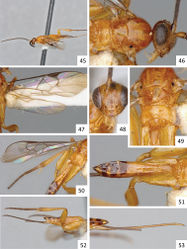Sendaphne olearus
| Notice: | This page is derived from the original publication listed below, whose author(s) should always be credited. Further contributors may edit and improve the content of this page and, consequently, need to be credited as well (see page history). Any assessment of factual correctness requires a careful review of the original article as well as of subsequent contributions.
If you are uncertain whether your planned contribution is correct or not, we suggest that you use the associated discussion page instead of editing the page directly. This page should be cited as follows (rationale):
Citation formats to copy and paste
BibTeX: @article{Fernandez-Triana2014JournalofHymenopteraResearch, RIS/ Endnote: TY - JOUR Wikipedia/ Citizendium: <ref name="Fernandez-Triana2014Journal of Hymenoptera Research">{{Citation See also the citation download page at the journal. |
Ordo: Hymenoptera
Familia: Braconidae
Genus: Sendaphne
Name
Sendaphne olearus Nixon, 1965: 204. – Wikispecies link – Pensoft Profile
Holotype
Female, BMNH. BRAZIL, Nova Teutonia, 2.iii.1937 (not examined).
Specimens examined
1 ♀ (CNC), Brazil, Nova Teutonia, 27°11'S, 52°23'W, 300-500m, 2.iv.1966, DNA Voucher code: CNCHYM 07019. 3 ♂ (FUSAGx), French Guiana, Kaw Mountain, Patawa, 4°32'42.20"N, 52°09'09.19"W, v.1999 and viii.1999, Malaise trap. 1 ♀ (BMNH) Peru, Loreto, Estacion Jenaro Herrera, 4°53'55.0"S, 73°39'00.4"W, 121m, 13–23.i.2011, D. Karlsson & N. Dale-Skey, BMNH(E) 2011-72, BMNH(E)#1249978.
Diagnosis
This species is similar to Sendaphne jatai, both having the lightest (i.e., more yellowish) coloration among all known species within the genus. Sendaphne olearus has brown bands on posterior margin of mediotergites 4–6, and its body coloration is generally more yellow-reddish (jatai body color is entirely yellow).
Distribution
Brazil, French Guiana, Peru.
Molecular data
The CNC specimen from the type locality in Brazil (CNCHYM 07019) rendered a minibarcode of 164 base pairs.
Comments
We could not see the holotype of this species, but the original description is adequately detailed for discrimination. We examined one female from the type locality (collected 30 years after the holotype female), the only known male specimens (from French Guiana), which were discussed in Braet (2006)[1], and the first known specimen from Peru.
Taxon Treatment
- Fernandez-Triana, J; Whitfield, J; Smith, M; Winnie Hallwachs, ; Janzen, D; 2014: Revision of the neotropical genus Sendaphne Nixon (Hymenoptera, Braconidae, Microgastrinae) Journal of Hymenoptera Research, (41): 1-29. doi
Images
|
Other References
- ↑ Braet Y (2006) Coup doeil sur la biodiversité des Braconidae (Hymenoptera, Ichneumonoidea) de Guyane francaise et reclassication de certaines espèces décrites par Brullé. Bulletin de la Société Royale Belge d’Entomologie 142(7-12): 155–172.

